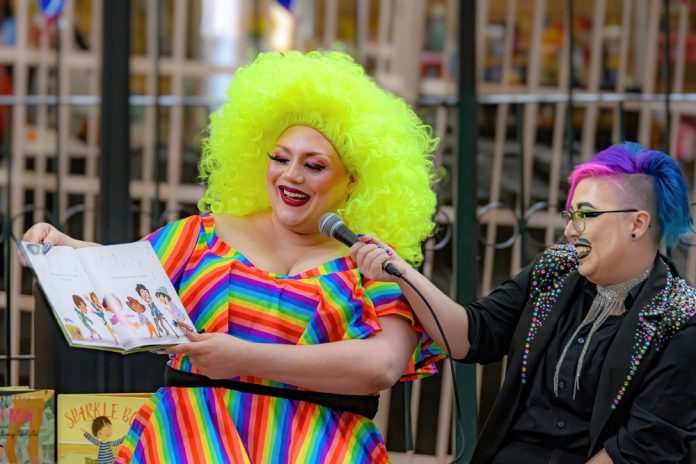
York Regional Police funding a drag queen breakfast for Pride Month while violent crime skyrockets in their jurisdiction has left taxpayers questioning the department’s priorities and use of public resources.
Key Takeaways
- York Regional Police hosted a taxpayer-funded “We Belong” drag queen breakfast to raise money for Revolution Now, an LGBTQ activism organization, despite rising violent crime rates in the region.
- The region is experiencing significant increases in violent crimes including homicides, shootings, and carjackings, which Police Chief Jim MacSween attributes to organized crime.
- Critics argue police resources should be directed toward addressing crime rather than funding cultural events that don’t directly contribute to public safety.
- The controversy mirrors a broader national trend where corporations are withdrawing from Pride event sponsorships, causing significant budget shortfalls for Pride organizations across North America.
- As private funding for Pride events decreases, government agencies like York Regional Police appear to be filling the gap with taxpayer dollars.
Public Safety vs. Pride Priorities
While violent crime continues its alarming rise in York Region, the local police department has allocated taxpayer funds to host a drag queen breakfast celebration. The event, dubbed “We Belong,” was designed to raise money for Revolution Now, a far-left LGBTQ activism organization. Critics argue this represents a fundamental misalignment of priorities at a time when public safety concerns are mounting. The timing is particularly troubling as York Region grapples with a documented increase in violent crimes involving firearms, including homicides, shootings, and a wave of carjackings that have left residents increasingly concerned about their safety and security.
“The York Regional Police in Canada hosted a “We Belong” drag queen breakfast to raise money for a far-left LGBTQ activism organization called Revolution Now.,” according to police.
York Regional Police Chief Jim MacSween has acknowledged the severity of the crime situation facing the community. “The trend in violent crime is a major concern,” he said at a news conference where police shared data on the surge. MacSween attributes the rise in crime to organized criminal elements and the proliferation of illegal weapons. While the department claims to be focusing resources on ensuring public safety, the allocation of funds for drag queen events raises serious questions about resource management during a time of crisis and whether political considerations are outweighing public safety imperatives.
Corporate America’s Retreat from Pride
The York Regional Police’s decision to fund Pride events comes at a time when corporate America is increasingly stepping back from similar sponsorships. Major Pride celebrations across the United States are facing significant financial shortfalls as corporations withdraw their support. San Francisco Pride is dealing with a $200,000 budget gap, while New York City Pride is scrambling to cover a massive $750,000 shortfall. In St. Louis, Anheuser-Busch ended its 30-year sponsorship of PrideFest, creating a $150,000 funding hole that organizers are struggling to fill through alternative means.
The corporate retreat reflects growing consumer sentiment against companies taking political positions. Many brands that previously embraced “Pride Month” marketing have quietly scaled back or withdrawn entirely. Target, once a major Pride sponsor, reduced its Pride merchandise offerings following significant customer backlashes and boycotts that impacted sales. Other major corporations including Comcast, PepsiCo, Nissan, and Diageo have similarly pulled their financial support from various Pride events across the country, reflecting a significant shift in corporate marketing strategies away from divisive social issues.
Taxpayers Footing the Bill
As private funding for Pride events dries up, government agencies like the York Regional Police appear to be stepping in with taxpayer dollars. This shift from private to public funding raises important questions about the proper role of government institutions and appropriate use of tax revenue. While private companies can freely choose which causes to support based on their own values and business interests, government agencies have a responsibility to remain politically neutral and focus on their core mandates. For police departments, this mandate centers on maintaining public safety and enforcing the law.
“If you come to Pride this year, that’s a revolutionary act. You are sending a message to those in Washington that, here in San Francisco, we still have the same values that we’ve always had — you can love who you love here. We’re not going to retreat from that,” said Suzanne Ford.
The explicitly political nature of many Pride events further complicates the issue of public funding. San Francisco Pride’s theme “Queer Joy is Resistance” and New York’s “Rise Up: Pride in Protest” highlight the political activism that underpins these celebrations. When government agencies fund such politically charged events, they risk alienating segments of the public they serve and potentially compromising their perceived neutrality. For law enforcement specifically, maintaining trust across the entire community is essential to effectively carrying out their primary public safety mission.






